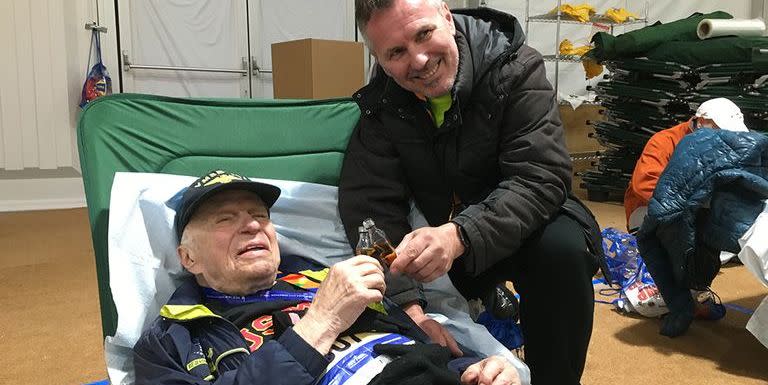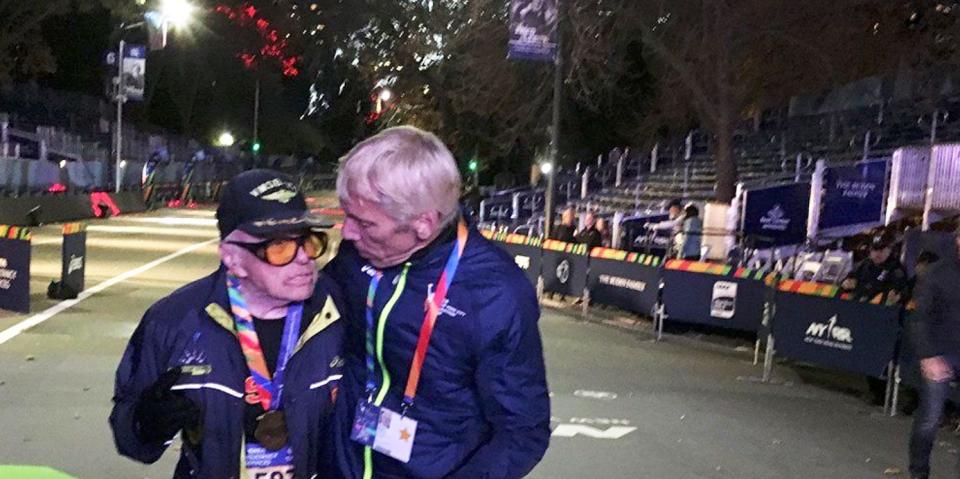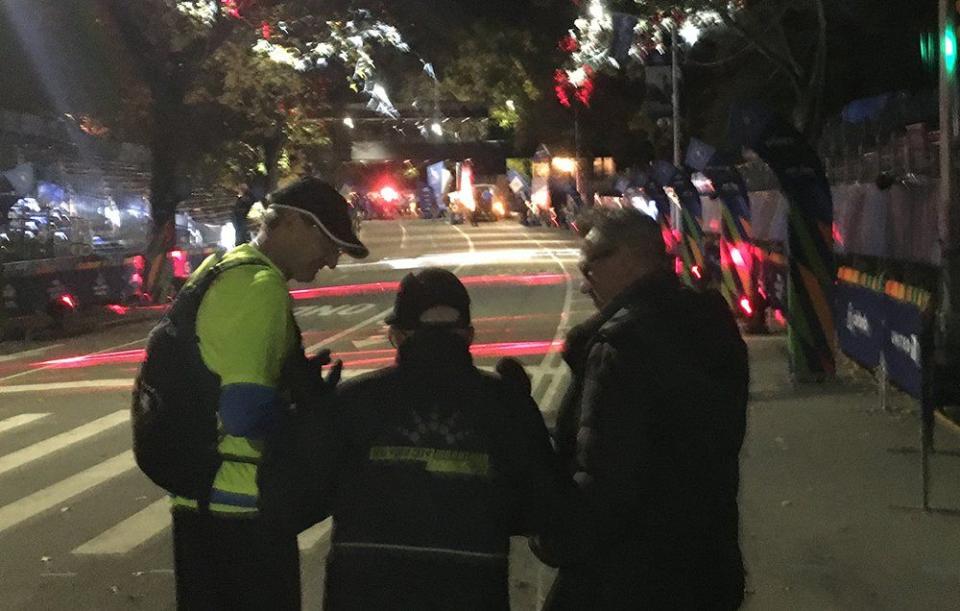World War II Marine, 96, Finishes Marathon With a Shot of Scotch

There are 100 meters of asphalt road left between Jonathan Mendes and the finish line of the New York City Marathon, and he still won’t explain exactly why he is doing this. Why, for the past 11 hours and 20 minutes this 96 year-old man has been running—well, not so much running as tottering—26.19 miles through all five of the city’s boroughs.
He looks up and smiles. You can see the creases around his eyes scrunch behind massive, orange-tinted sunglasses. You get the sense that he’d rather not explain himself. You might try and fish for an inspiring answer, some reason why this limping man, wearing a 16-year-old Asics windbreaker, is still out in the 45-degree darkness, but he won’t give one—nothing satisfying, anyway.
As a bomber pilot in the Marines, Jonathan Mendes flew more than 100 missions in World War II and then more than 70 missions in the Korean War. He trained John Glenn and Ted Williams. He graduated from Dartmouth College and Harvard Business School. Now he lives in a spacious apartment on Manhattan’s Upper East Side. He still walks two miles around Central Park’s reservoir every morning at 7:30 a.m., and drinks a scotch every afternoon at 4 p.m.
He doesn’t need to tell you why he’s out here, completing his 16th New York City Marathon. He takes another step forward.
“You have to have goals in life,” he says. “They don’t have to be important. But at this stage I’ve done it all. I’ve skied all over the world. I’ve canoed the great rivers of the world. I flew dive-bombers for the Marine Corps in World War II, and jet fighter attack planes in Korea. And I never got hurt, so I don’t have any bad memories.”
When he walks—which is slowly, with short steps, at a 25-minute-per mile pace—his back is arched so that the brim of his blue cap, emblazoned with the U.S. Marine Corps insignia, is pointed toward the ground. He clutches the sleeves of his two support guides to keep balance. He’s been in this position, inching his way forward, for the past 13 miles.
He stops at the top of the final hill on West Drive and looks up. Spotlights swirl in purple and blue across the empty road. Carly Rae Jepsen echoes from speakers near the finish. There are three people standing in the grandstands. Another cluster of a dozen or so people mingles beyond the finish line’s arches. No one has seen him yet. He lifts his right leg up, bending it at the knee to stretch, then he lifts his left leg, readying himself for the final kick.
“More like the final crawl,” he says. He can see the finish line at last through his sunglasses. “How about that?” he says.

The man on his right is Tom Mangan, Mendes’ personal trainer. Mangan works with Mendes twice a week, doing bodyweight exercises and stretches. With the consultation of a doctor, Mangan cleared Mendes to enter the race two weeks ago.
“Jon is an exceptional man,” Mangan says. “We have been laughing all day.”
They started in Staten Island at 8:51 a.m. with the disabled athletes. It is now 8:14 p.m. Eritrea’s Ghirmay Ghebreslassie sprinted across the same spot at a sub-5-minute-per-mile pace more than eight hours ago, winning the race in 2:07:51. It took Mendes more than 30 minutes to finish the last mile.
The man on Mendes’ left is Art Berman, a 35-time marathoner and volunteer with the organization Achilles International, which matches older and disabled athletes with guides to complete endurance events. Berman met Mendes when they were paired at the start line of the 2015 marathon race. Mendes dropped out at mile 16 last year, after his knees gave him trouble.
“Jon just likes the challenge of doing this. He is a very determined man, if you haven’t figured that out,” Berman says.
With 20 meters left, volunteers in blue jackets notice the ambling crew inching closer. Peter Ciaccia, the marathon’s race director, jogs out and puts an arm around Mendes. They cross the line together, then Ciaccia procures a medal and places it around Mendes’ neck.
“Semper fi,” Ciaccia says.
“Do or die,” Mendes replies.
The official clock, on a temporary pillar in the middle of the finish line, stopped tracking runners more than 45 minutes ago. Mendes’ time will not appear in official results. His guides aren’t really even sure what it is.
According to the New York Road Runners, the organization that puts on the race, the oldest official finisher this year was 88-year-old Bertha McGruder. The oldest official finisher ever is 91. Mendes has 11 official finishes, with five more coming after the clock stopped.
He doesn’t seem to care that his time won’t count this year.
A marathon for the nonagenarian doesn’t seem to have hurt him that bad. He smiles at the finish line.
“I’d like to go lie down,” he says. A medical volunteer guides him to a large white tent. He is lowered in to a bed with the back raised at a 45-degree angle. The volunteer asks if he wants something to drink. Maybe some hot chocolate or some water?
He wants scotch.

Mangan pulls out a small brown paper bag from his pocket and produces three miniature bottles of brown liquor—Johnnie Walker Black Label. Mendes grabs a bottle.
“I’ve been saying for years that the key to living this long is a shot of whisky a day and a good woman, in that order,” Mendes says.
The good woman approaches, wearing a purple vest and carrying a clipboard. She is another volunteer nurse. She kneels down beside the low bed and asks Mendes how he is doing.
He takes a sip of scotch and grabs her hand. “Oh, I am just fine,” he says.
You Might Also Like

